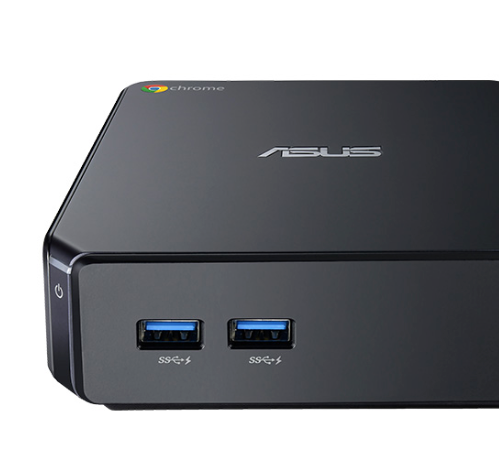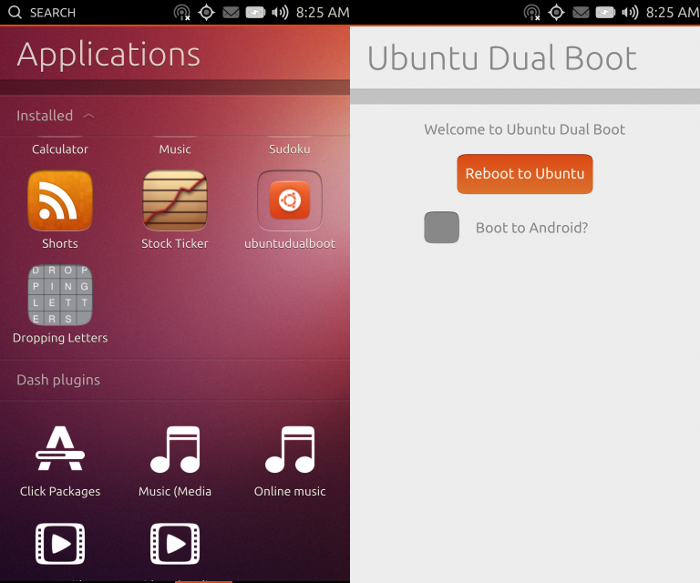
Set up your own personal cloud for free with Tonido
There's a lot to like about cloud backup and sync -- security, for one, and the convenience of being able to access your files remotely for another. But cloud storage can be an expensive option, which is where Tonido comes in.
It provides a trio of tools -- Tonido Desktop and Tonido Sync for desktop, Tonido Mobile for mobile -- that lets you turn your home storage into a personal cloud. So long as your backup needs are catered elsewhere, you can access, share, stream and -- to a limited degree -- sync data without paying a single cent.

Schooled by Linux -- 1,700 students get Ubuntu laptops
Linux is everywhere; from mobile phones to web servers. Even Chromebooks run Linux. Ironically, Chrome OS is a poor platform for actually learning about the open-source kernel. This is because Google's OS is limited by design. And so, it does not behave like a typical Linux distribution.
Instead, students would be better served by using a true Linux distribution, such as Ubuntu, Fedora or Mageia. With that said, a forward thinking school in Pennsylvania has done just that. Penn Manor High School has purchased 1,700 laptops running Ubuntu.

Vodafone hooks up with Canonical for Ubuntu Linux for mobile
For someone looking to begin a Linux journey, quite often, the first leg of it involves Ubuntu. Sure, there are many other distributions, but none can match it in popularity or ease of use. While my personal preference is Fedora, I concede that Ubuntu is probably more suitable for the majority of desktop users.
Last year, despite its failed crowd funding campaign, Canonical managed to make waves by introducing the concept for an Ubuntu smartphone. Of course, no matter how great the device is on paper, if carriers don't support it, it is pretty much dead in the water. Today, the Ubuntu phone project gains an important ally in Vodafone.

ASUS unveils the Chromebox -- sexy and inexpensive
The home computer landscape is constantly undergoing transformations. For a while, tablets were seen as the future, but Google's Chrome OS and associated Chromebooks threw a wrench into that idea. While tablets are still wildly popular and will continue to be, many people are finding them not ideal for content creation. I love my iPad Air with all my heart but given the option, a Chromebook would be my choice for writing.
However, when I am home, I still prefer my desktop computer. Maybe I am just stuck in my ways, but I like sitting at a desk with a very large monitor. With that said I have longed for a quality Chrome OS desktop. While the Chrome desktop concept, called Chromeboxes, were previously realized by other manufacturers, those models never really rung my bell. Well, ding, ding, today my bell is ringing as Asus announces its new Chromebox and it is sexy.

Linux distro Mageia hits version 4 -- download it now
When the discussion of popular Linux distributions comes up, typically, you will hear about Ubuntu, Mint and Fedora. However, there has been a semi-newcomer making waves in the Linux community -- Mageia Linux (started in 2010). Originally a fork of Mandriva, it has grown to be so much more. In fact, it is currently ranked as number four on the Distrowatch page-hit ranking. While that ranking should be taken with a grain of salt, it is typically an accurate portrayal of popularity.
Today, Mageia announces that the fourth version of the operating system is ready for download. While the logic of making such an announcement on Super Bowl weekend is questionable, it is nonetheless exciting.

From Windows XP to Linux? -- you'd have to be mad!
It has been suggested that the people who are still hanging onto Windows XP after all of these years are going to continue to do so once support officially ends in April. Microsoft is obviously keen to herd people towards Windows 8.1, but there is a good deal of resistance. Some have proposed Linux as a viable alternative; to me, this seems like a completely nonsensical "upgrade" path. Brian managed to cause quite some excitement yesterday when he wrote that Windows XP refugees should migrate towards Linux rather than considering the latest version of Windows. Without wanting to fall out with Brian, I think he's plain wrong.
One of the reasons many people cite for not wanting to upgrade to Windows 8 or 8.1 is that they don’t want to have to deal with the Start screen. They have become used to things working in a certain way and, while not perhaps entirely resistant to change, need a little encouragement into seeing the value of things. Brian suggests that one of the reasons to switch to Linux is that "you get to learn something new." If this is supposed to be an attractive element of Linux, then users may as well spend the time getting used to Windows 8.1.

Windows XP home users should upgrade to Linux -- not Windows 8.1
The Windows XP death clock is ticking away. While Microsoft has extended support for malware protection, do not be fooled -- XP will be officially unsupported on April 8. If Microsoft has its druthers, these XP users will upgrade to Windows 8 and maybe even buy a new computer.
However, there is a problem with this -- the Windows 8 UI is radically different from XP and people do not like change (especially people clinging to an operating system from 2001). Also, they may not need to buy a new computer, because their existing is probably fast enough... for Linux!

Linux photo management app Shotwell development handed off
Using a Linux distribution as your desktop operating system can be hit or miss. Depending on your needs, it may work brilliantly or horribly. You see, most mainstream apps are not available, so you must depend on alternative software. For instance, for some users, GIMP is a passable replacement for photoshop and Libreoffice for Microsoft Office.
When it comes to photo management, there is really only one great Linux app -- Shotwell, by a company called Yorba. If you do amateur or professional photography and you want to organize your photos, there really isn't a better piece of software on Linux. Sure, there are alternatives such as F-Spot, but Shotwell is the definitive app. Sadly, it hasn't been getting the attention it needs lately, which was worrying to some users (myself included). As a result, Yorba has handed over development and the recipient is rather surprising -- the Elemenatary OS team.

CentOS joins the Red Hat family -- Fedora gets a step-brother
Red Hat Enterprise Linux is a wonderful operating system for commercial users. However, there is one major downside to it -- it costs money. Luckily, Red Hat provides the source code to the open-source community. This enables groups to use the code to build their own free distributions, such as CentOS. While these distributions are just as functional as RHEL, they lack support from Red Hat.
Even though the existence of CentOS can potentially take money from Red Hat's pockets, there never seemed to be any resentment or animosity. In fact, just yesterday, Red Hat surprised the Linux community and announced that it will sponsor that distribution going forward. In other words, CentOS is now owned by Red Hat Inc -- the father has officially adopted its illegitimate baby and Fedora has a new step-brother.

Happy Birthday Linus Torvalds! How's that Linux thing doing?
As 2013 crawls towards the finish line, we can reflect on Christmas, the gifts we gave and received and for some people, the birth of Jesus. However, December contains another significant birthday, belonging to Linus Torvalds. Yes, the father of Linux was born this month.
His birthday is a great time to thank the man for his contributions. However, it also marks an appropriate time to reflect on the state of Linux. Was 2013 a good or bad year for the kernel?

Canonical announces developer preview of Ubuntu and Android dual-boot
Android is Linux; it utilizes Linus Torvald's kernel. However, for many, it is looked at as a bastardization of Linux -- not a true distribution. I get that; after all, Google's own Android apps are closed-sourced and many of the devices have locked bootloaders. These hindrances, whether the fault of Android or not, are not exactly in the spirit of the free and open Linux community.
Many users crave more -- to have a full-fledged Linux distribution on their mobile device. And so, Canonical, owner of one of the most popular distributions, Ubuntu has been trying to answer the prayers of those dissatisfied with Android, with Ubuntu Touch. While the software has been promising, it is not yet ready to replace Android. Today, Canonical announces an interim solution -- the Ubuntu and Android dual boot developer preview.

Fedora 20 is here -- an early Linux Christmas present
Many Linux users have been holding their breath in anticipation for the 20th version of Fedora Linux, codenamed Heisenbug. While not the most popular distribution overall, it is the distro of choice for one influential user -- Mr. Linus Torvalds, creator of the Linux kernel. Not to mention, many other users around the globe.
Sadly, version 20 has missed its deadline a couple of times. While those delays were disappointing, it was also appreciated. After all, you do not want a buggy operating system, do you? Luckily, Santa Claus came a little early to the Linux community -- the final version of Fedora Linux is here now!

Get your hands on Valve's SteamOS beta right now!
Anyone who fancies the idea of building their own gaming box can head over to the Valve website can grab themselves a beta copy of SteamOS. The Linux-based operating system is available for anyone to download free of charge and coincides with the shipping of 300 prototypes of Valve's Steam Machine devices to specially selected testers. The OS and boxes have both been designed with pure gaming in mind -- but the system requirements are quite specific.
The download weighs in at 960MB, and there are reports that the servers are struggling as legions of eager gamers hit the link. But before you rush over to the site and start the download for yourself, take a moment to check whether your rig is up to the task. You'll need a 64-bit processor, but both Intel and AMD will do the job equally well, and 4GB of RAM is also required.

Red Hat Enterprise Linux 7 Beta -- try the future now
Fedora is my favorite Linux distribution. Sadly, the next release, version 20, has been delayed until later in the month. This news has ruined my holidays -- it is like Santa Claus gave my computer coal.
However, the owner of Fedora, Red Hat, announces some news to brighten my spirits with the first beta release of Red Hat Enterprise Linux (RHEL) 7. IT professionals should stock their mini-fridges with Red Bull -- the future of enterprise Linux is now.

Red Hat Enterprise Linux 6.5 is here
It was only a month ago that Red Hat Enterprise Linux 6.5 Beta became available. Apparently, the beta-testing went smoothly because today, Red Hat announces that the final version is immediately available. In other words, if you work in IT and your company uses RHEL, you had better buy some Red Bull.
"Red Hat Enterprise Linux 6.5 is designed for those who build and manage large, complex IT projects, especially enterprises that require an open hybrid cloud. From security and networking to virtualization, Red Hat Enterprise Linux 6.5 provides the capabilities needed to manage these environments, such as tools that aid in quickly tuning the system to run SAP applications based on published best practices from SAP", says the company.
